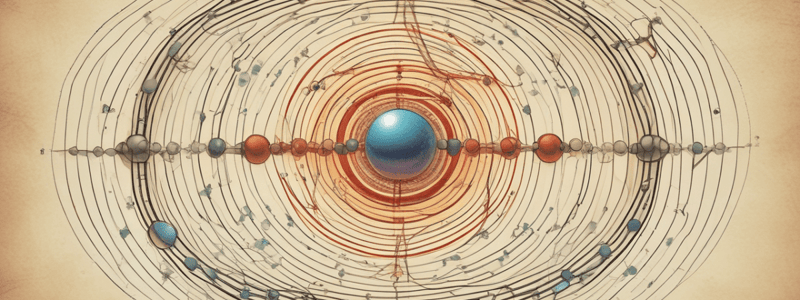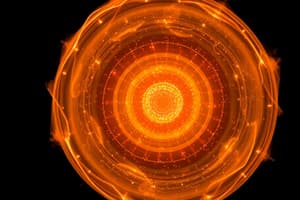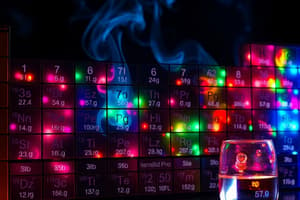Podcast
Questions and Answers
What is the reason for nitrogen having more ionisation energy than oxygen?
What is the reason for nitrogen having more ionisation energy than oxygen?
- Nitrogen has a half filled p shell (correct)
- Nitrogen has a fully filled d shell
- Nitrogen has a fully filled s shell
- Nitrogen has a fully filled p shell
What is the general trend of ionisation potential with respect to the number of valence electrons?
What is the general trend of ionisation potential with respect to the number of valence electrons?
- Ionisation potential shows no correlation with the number of valence electrons
- Ionisation potential remains the same with the change in the number of valence electrons
- Ionisation potential increases with the increase in the number of valence electrons (correct)
- Ionisation potential decreases with the increase in the number of valence electrons
Which of the following elements has the highest ionisation energy?
Which of the following elements has the highest ionisation energy?
- Kr
- Cl
- He (correct)
- Ne
What is the relationship between ionisation potential and reducing power of an element?
What is the relationship between ionisation potential and reducing power of an element?
What does the sudden jump in ionisation energy values indicate?
What does the sudden jump in ionisation energy values indicate?
What is the relative nature of the bond formed during the combination of two elements dependent on?
What is the relative nature of the bond formed during the combination of two elements dependent on?
What is the main reason why atomic radii of noble gases are largest in their respective periods?
What is the main reason why atomic radii of noble gases are largest in their respective periods?
What is the relationship between the size of an atom and its ionisation potential?
What is the relationship between the size of an atom and its ionisation potential?
Which of the following is NOT a factor affecting the value of ionisation energy?
Which of the following is NOT a factor affecting the value of ionisation energy?
Why is it more difficult to remove an electron from the outermost orbit of an inert gas?
Why is it more difficult to remove an electron from the outermost orbit of an inert gas?
What is the effect of an increase in nuclear charge on the ionisation potential of an atom?
What is the effect of an increase in nuclear charge on the ionisation potential of an atom?
What is the reason why the ionisation energies of inert gases are greater than that of their immediate neighbours?
What is the reason why the ionisation energies of inert gases are greater than that of their immediate neighbours?
What is the energy required to remove an electron from the outermost orbit of an isolated gaseous atom in its ground state?
What is the energy required to remove an electron from the outermost orbit of an isolated gaseous atom in its ground state?
Why is the second ionisation energy higher than the first?
Why is the second ionisation energy higher than the first?
What is the trend in the variation of ionisation energy in the periodic table?
What is the trend in the variation of ionisation energy in the periodic table?
Which of the following atoms has a lower ionisation energy?
Which of the following atoms has a lower ionisation energy?
What is the unit of measurement for ionisation energy?
What is the unit of measurement for ionisation energy?
What is the energy required to remove one electron from a unipositive ion to form a bipositive ion?
What is the energy required to remove one electron from a unipositive ion to form a bipositive ion?
What is the significance of Guoy's balance in the study of magnetism?
What is the significance of Guoy's balance in the study of magnetism?
Which of the following is a characteristic of ferromagnetic substances?
Which of the following is a characteristic of ferromagnetic substances?
What is the trend observed in the covalent nature of hydrides across a period?
What is the trend observed in the covalent nature of hydrides across a period?
What is the reason behind the diagonal relationship between certain elements of the 2nd and 3rd periods?
What is the reason behind the diagonal relationship between certain elements of the 2nd and 3rd periods?
What is the significance of the number of unpaired electrons in a substance?
What is the significance of the number of unpaired electrons in a substance?
Which of the following hydrides exhibits a high ionic character?
Which of the following hydrides exhibits a high ionic character?
Which of the following ions will have the maximum extent of hydration?
Which of the following ions will have the maximum extent of hydration?
Which of the following is an exception to the chemical periodicity?
Which of the following is an exception to the chemical periodicity?
What is the trend of acid-base character of oxides on moving across a period?
What is the trend of acid-base character of oxides on moving across a period?
What is the oxidation state of an element in a compound?
What is the oxidation state of an element in a compound?
What determines the magnetic properties of matter?
What determines the magnetic properties of matter?
What is the characteristic of a diamagnetic substance?
What is the characteristic of a diamagnetic substance?
What is the term for the enthalpy change that accompanies the dissolving of 1 mol of gaseous ions in water?
What is the term for the enthalpy change that accompanies the dissolving of 1 mol of gaseous ions in water?
Which of the following substances has a net magnetic moment owing to the presence of unpaired electron(s) in atoms, ions or molecules?
Which of the following substances has a net magnetic moment owing to the presence of unpaired electron(s) in atoms, ions or molecules?
What is the unit of measurement for the magnetic moment of a substance?
What is the unit of measurement for the magnetic moment of a substance?
Which of the following types of hydrides are better reducing agents than the others?
Which of the following types of hydrides are better reducing agents than the others?
What is the effect of an increase in nuclear charge on the magnetic properties of a substance?
What is the effect of an increase in nuclear charge on the magnetic properties of a substance?
What is the relationship between the number of unpaired electrons and the magnetic moment of a substance?
What is the relationship between the number of unpaired electrons and the magnetic moment of a substance?
Flashcards are hidden until you start studying



